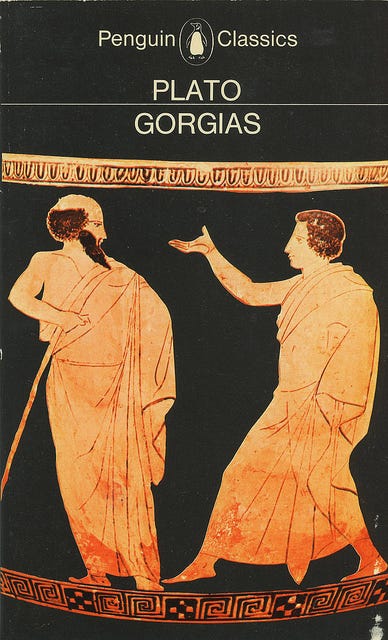
Dear Classical Wisdom Reader,
We’ve been looking a lot at the Olympics over the last couple of weeks.
So, now we’re looking at something a little less physical and a little more philosophical. And also, very practical.
Today’s article is on Aristotle’s Rhetoric, and focuses on the power of words, the power of philosophy, and the power of persuasion.
What does it take to provide a good argument?
Is a strong argument enough on its own to win people over by its own merits… or is it all in the presentation?
And ultimately, should our arguments appeal to emotions?
Perhaps the art of rhetoric is a useful tool in an era of lowered attention spans, or maybe it’s something to be suspicious of…
These are big questions that Aristotle and Plato, student and teacher, were divided on, as you can find out just below.
Millennia later, in our era of endless information and mass communication, it’s likely even more relevant than it ever was in their day.
All the best,
Sean Kelly
Managing Editor
Classical Wisdom
Become A Member! Support the Classics and gain access to our archives of exclusive podcasts, e-books and articles (including a fun look at ancient fitness tips!)
The Power of Persuasion: Aristotle’s Rhetoric
by Van Bryan
In this life, whether you are a philosopher or not, you will need to know how to persuade people.
Aristotle tells us as much within his work on rhetoric, aptly titled Rhetoric.
This was one of old Artie’s books that I only glossed over in my formative years. Depending on whom you read in your introductory to philosophy class as an undergrad, you might be of the belief that philosophy and rhetoric are mutually exclusive. They are as incompatible as cats and dogs, cops and robbers, Giants and Jets fans. You get the picture.
Plato was one such chap who despised rhetoric. He describes it, not as an art form, but as “a type of flattery”, within his dialogue Gorgias.
Plato’s distaste for rhetoric is perhaps not surprising. The rock stars of rhetoric during the age of classical Greece would have been the Sophists, the ancient equivalent of personal injury attorneys.
The Sophists were a series of wandering lecturers, skilled rhetoricians who would happily use their abilities to argue on behalf of anybody or any cause, so long as the price was right. Plato viewed them as the anti-philosophers. They did not care for objective truth or wisdom, only in convincing others through dubious and questionable means. To Plato, the Sophists, as well as rhetoric in general, was something of a disease that infected the minds of citizens and distracted them from the noble pursuits of philosophy.
Aristotle, on the other hand, was a bit more realistic about the state of human nature. He did espouse that through contemplation and rigorous study, we could come to an understanding of that which is virtuous and noble. However, it does little good if we are unable to convince others to believe us!
Rhetoric then becomes something of a necessary evil, a means to convince people who don’t already agree with us about the virtuous and noble lessons that we discover through philosophical contemplation.
Aristotle also makes the claim that rhetoric is not only essential to the field of philosophy, but to every other field of study as well. For in medicine it is crucial for the physician to persuade his patients to pursue the proper habits for health. A political scientist must be skilled in rhetoric so he can convince the lawmakers to enact laws that are beneficial for the polis. This goes for all crafts and art forms, Aristotle says.
Rhetoric, additionally, is also a means of defense for us. Just as we must be physically fit and strong in order to protect ourselves form physical violence, we must also be skilled rhetoricians so as to defend ourselves against discourse aimed at harming our reputation.
In short, the stakes are actually pretty high. So, what is rhetoric and how do we be better at it?
Rhetoric, Aristotle says, is in many ways similar to dialectic, or philosophical argumentation. It can be said that both rhetoric and dialectic are concerned with answering questions that are the concern of everybody. Both practices can be applied to any topic, and both are incredibly useful.
Dialectic, however, is more clinical while rhetoric, out of necessity, is more emotional. Dialectic demands that we arrive at a conclusion by virtue of the plausibility of the argument. Rhetoric, however, cares only that we arrive in close proximity to the truth by any means necessary. Dialectic, therefore, is the best method for teaching, while rhetoric is used as an art form for getting people to agree with you.
Pivoting momentarily, we can see the difference between dialectic and rhetoric within Plato’s The Apology. Within the dialogue, Socrates, the father of Western philosophy, is defending himself in court against charges of impiety and corrupting the youth.
Rather than make use of the tools of rhetoric, Socrates leans heavily on what we might consider a philosophical, or scientific argument to make his case. He does not appeal to the emotions of the crowd. He does not parade his children before the jurors. He does not flatter or appeal to the emotional proclivities of his jurors.
Socrates is interested in convincing others of his position via the merits of his arguments. He has his own reasons for this. As a man who championed wisdom and understanding above all, it would have been slightly hypercritical for him to make use of rhetoric, which relies heavily on emotional appeals, to win his case.
Still, it might have been in the best interest of the philosopher to utilize some of rhetorician’s tools. Socrates’ dispassionate argument is insufficient. He is found guilty and subsequently shuffled off of this mortal coil.
But now back to Aristotle.
A good persuasive argument often appeals to commonly held beliefs. Depending on your opinion on the state of humanity, this might be a very bad thing indeed. However, Aristotle is insistent that human beings have a tendency to lean towards truth and that they mostly arrive at truth on their own. Appealing to popular beliefs, therefore, will often land us in close proximity to the truth.
“Moreover human beings have a sufficient natural tendency toward what is true, and they mostly reach the truth. Hence the one who is good at aiming at the truth is also the one who is good at aiming at what is commonly believed.” –Aristotle (Rhetoric)
To craft a good persuasive argument, we must consider three things.
-
The character of the speaker
-
The condition of the listener
-
The strength and plausibility of the argument itself
The character of the speaker is defined by the speaker’s intelligence, virtue, and goodwill. An intelligent, virtuous man will be deserving of confidence, and he will inspire confidence quickly within the listeners.
While Aristotle is speaking of virtue within the context of making a persuasive argument, this small bit of information also supplements Aristotle’s ethical philosophy. Namely that the best life is one that actively expresses virtue.
We must also consider the condition of the listener in order to craft a persuasive argument. We must recognize and soothe people’s fears. We must identify the emotional side of the argument. Is somebody’s pride on the line? Are they feeling embarrassed? Are they fearful that retracting their position will make them look weak?
We must recognize and acknowledge these possibilities and edge around them accordingly if we hope to be persuasive. We must also recognize that people’s attention spans are notoriously short! Consider inserting witty remarks within your argument to grab people’s attention. I like to consider myself a good student of Aristotle in this regard.
How many philosophers does it take to screw in a light bulb?
Four- one to screw in the light bulb and three others to say “Most assuredly Socrates!” “Excellent point Socrates!” “I believe you are correct Socrates!”
Finally, a good persuasive argument must still lean heavily upon the same rules that make a good philosophical, or scientific, argument.
Identify premises that are true and demonstrable. Construct these premises in such a way so that they naturally support a final, previously unknown supposition that we call a conclusion.
Ask yourself, “Are my premises plausible?” “Do they naturally follow and support the conclusion?” “Are their any lapses in my logic that could leave room for implausibility?”
Aristotle’s insistence that a good persuasive argument must still be founded upon a good logical argument is demonstrative of his idea of rhetoric in general. Rhetoric is not some unwieldy weapon that we can use for our personal glory or interest.
The sophists were guilty of such a crime. They used a bastardization of rhetoric to convince people of a position no matter the truth-value contained within that position. They were self-serving in this regard and were subsequently damaging the souls of their fellow citizens.
It is likely that Aristotle had it in his mind to combat such dangers when he laid out his philosophy of rhetoric. He wanted to equip thoughtful, serious, well-intentioned people with the intellectual ammunition that would allow them to cut through the infuriating malarkey of public debate.
He was something of a realist in this regard. He recognized the infuriating tendency for convenient nonsense to win out over logical arguments, and he set about to discover a way to correct such an injustice.
The reason I find Aristotle’s Rhetoric to be of such interest is because he wrote on the topic not for his own curiosity or even for the sake of knowledge itself. In many ways Rhetoric is very much a public service announcement. It is the philosopher’s attempt to better humanity by equipping us with the tools to guide our fellow man away from ignorance, away from prejudice, and toward the light of understanding.
Más info en https://ift.tt/wS089Qe / Tfno. & WA 607725547 Centro MENADEL (Frasco Martín) Psicología Clínica y Tradicional en Mijas. #Menadel #Psicología #Clínica #Tradicional #MijasPueblo
*No suscribimos necesariamente las opiniones o artículos aquí compartidos. No todo es lo que parece.




No hay comentarios:
Publicar un comentario